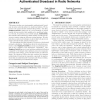Free Online Productivity Tools
i2Speak
i2Symbol
i2OCR
iTex2Img
iWeb2Print
iWeb2Shot
i2Type
iPdf2Split
iPdf2Merge
i2Bopomofo
i2Arabic
i2Style
i2Image
i2PDF
iLatex2Rtf
Sci2ools
117
click to vote
SPAA
2010
ACM
2010
ACM
Securing every bit: authenticated broadcast in radio networks
This paper studies non-cryptographic authenticated broadcast in radio networks subject to malicious failures. We introduce two protocols that address this problem. The first, NeighborWatchRB, makes use of a novel strategy in which honest devices monitor their neighbors for malicious behavior. Second, we present a more robust variant, MultiPathRB, that tolerates the maximum possible density of malicious devices per region, using an elaborate voting strategy. We also introduce a new proof technique to show that both protocols ensure asymptotically optimal running time. We demonstrate the fault tolerance of our protocols through extensive simulation. Simulations show the practical superiority of the NeighborWatchRB protocol (an advantage hidden in the constants of the asymptotic complexity). The NeighborWatchRB protocol even performs relatively well when compared to the simple, fast epidemic protocols commonly used in the radio setting, protocols that tolerate no malicious faults. We th...
Authenticated Broadcast | Distributed And Parallel Computing | Fault Tolerance | Non-cryptographic Authenticated Broadcast | SPAA 2010 |
Related Content
| Added | 18 Jul 2010 |
| Updated | 18 Jul 2010 |
| Type | Conference |
| Year | 2010 |
| Where | SPAA |
| Authors | Dan Alistarh, Seth Gilbert, Rachid Guerraoui, Zarko Milosevic, Calvin C. Newport |
Comments (0)

